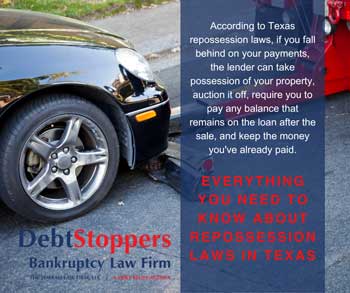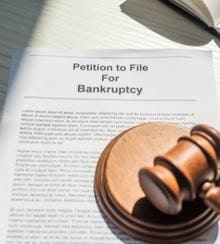Updated on 3rd Jan 2024
Everything You Need To Know About Repossession Laws in Texas

Are you worried that you might lose your vehicle or some other personal property to repossession?
You should talk to a lawyer immediately. According to Texas repossession laws, if you fall behind on your payments, the lender can take possession of your property, auction it off, require you to pay any balance that remains on the loan after the sale, and keep the money you've already paid.
Fortunately, you can avoid losing your property and stop repossession by filing for bankruptcy. It’s essential to act quickly when facing the possible loss of your property, so you should talk to a repossession lawyer as soon as possible. Your lawyer can help you file for bankruptcy and stop your lenders from repossessing your belongings.
When Are You Threatened by Repossession in Texas?

Under Texas laws, your possessions can be repossessed if you have defaulted on a loan that is secured by that property. This means that you pledged the thing you were buying as collateral to secure the loan, and if you fail to make the required payments, the lender has the right to repossess it to recover the debt.
Notably, the laws allow lenders to repossess as soon as you are in default. Typically, this means the moment your first payment becomes late. Although your contract may include a grace period, these usually only apply to late fees and not when your vehicle can be repossessed. In most cases, your vehicle can legally be repossessed the day after you miss a payment.
That’s why it’s crucial to discuss your situation with a knowledgeable lawyer as soon as you become aware that you are likely to fall behind on your car payments.
How to Cope with Repossession in Texas?
Coping with repossession in Texas can be stressful, but there are steps you can take to manage the situation. If you are in danger of missing a payment, you should immediately contact an experienced attorney who specializes in Texas repossession laws. An attorney can review your case, advise you on your rights, and determine if there were any legal violations during the repossession process.
The Best Repossession Lawyers in Texas
Remember, repossession laws and procedures can vary by state and situation. Seeking professional advice from a lawyer experienced in Texas repossession laws can provide valuable guidance on your specific circumstances and help you navigate through the process while protecting your rights.
To find the best repossession lawyers in Texas you should do your homework to ensure you choose a knowledgeable and experienced professional who can help you with your specific legal needs.
Begin by seeking recommendations from trusted sources, such as friends, family, or colleagues who have previously dealt with repossession issues or legal matters. They might refer you to an attorney they found effective. Additionally, online legal directories and bar association websites can provide a list of attorneys specializing in repossession cases. Alternatively, you can check reviews and testimonials online. Look for reviews and testimonials from previous clients. While these should be considered alongside other factors, they can offer insights into an attorney's professionalism, communication style, and success in handling repossession cases.
You can also explore online attorney directories like Avvo, FindLaw, or Martindale-Hubbell. These platforms offer information about attorneys' backgrounds, experience, client reviews, and ratings, helping you assess their expertise in repossession cases. You can also contact the State Bar of Texas, which can provide referral services or directories of attorneys specializing in various practice areas, including repossessions.
Ultimately, you should look for attorneys with specific experience in repossession law. Review their websites, profiles, or biographies to understand their track record, years of experience, and successful outcomes in handling repossession cases.
Once you have narrowed down your list of potential attorneys, you can schedule consultations with them. During these meetings, discuss your case, and ask relevant questions about their experience, approach, fees, and how they plan to handle your repossession matter. During the consultation assess your comfort level and choose an attorney with whom you feel comfortable discussing your case and who communicates effectively and transparently.
It’s also important to understand the attorney's fee structure upfront. Some may charge hourly rates, while others may work on a contingency basis or offer flat fees. Clarify all fees and payment terms before hiring an attorney.
By conducting thorough research, evaluating experience, checking references, and meeting potential attorneys, you can find a repossession attorney in Texas who is best suited to handle your legal needs effectively.
What Does the Repossession Procedure Involve?

If a lender wants to repossess your car, they may provide notice of their intent to do so; however, the law does not require them to do so, and often you will find out your vehicle is being repossessed when the repo agent shows up to tow it away.
Once the vehicle has been physically repossessed, the lender will sell it through a private sale or auction. The sale price will then be applied to the repossession costs and the remaining balance on your loan. If the sale does not cover the entire balance and it often doesn’t, you will owe the remainder, which is known as a “deficiency balance.”
The repossession process is complicated but there are steps you can take to help you deal with a repossession.
Get legal advice. It’s important to immediately consult with an attorney who specializes in Texas repossession laws. An attorney can review your case and advise you on your rights.
Understand Your Rights: In Texas, lenders can repossess a vehicle without a court order as long as they don't breach the peace. However, they cannot enter your property without permission or use force. Familiarize yourself with Texas laws regarding repossession to know your rights.
Contact Your Lender: If you're facing financial difficulties and cannot make payments, communicate with your lender immediately. Some lenders might be willing to negotiate new payment arrangements or alternative options to avoid repossession.
Check for Violations: If you believe the repossession was done unlawfully (e.g., breach of peace), document the situation and seek legal advice. Unlawful repossession may entitle you to compensation or legal recourse.
Redeem the Vehicle: In Texas, you have the right to redeem the vehicle before it's sold. This means paying off the entire loan balance, including any fees or costs associated with the repossession.
Avoiding Further Negative Impact: If the vehicle is repossessed and sold, you may still be responsible for any deficiency balance (if the sale proceeds don't cover the loan amount). To avoid this, explore options to negotiate with the lender or potentially reinstate the loan.
Financial Planning: Evaluate your financial situation and create a plan to prevent similar situations in the future. Budgeting, reducing unnecessary expenses, and exploring ways to increase income can help manage your finances better.
What Are Your Rights?
Although they are limited, Texas laws grant you certain rights during the repossession process. For instance, repo agents cannot breach the peace, break into your garage, cause damages, or threaten you while taking your property.
Likewise, the lender is legally required to send you a notice that includes important information before your car is sold. You also have the right to “redeem” your vehicle after it has been repossessed by paying the total remaining balance along with any repossession costs. However, you must exercise this right before the vehicle is sold.
A local lawyer can tell you more about your rights and remedies during the process.
What Are Your Options if Your Property is Repossessed?
After a repossession, the relevant laws provide a few methods available to recover what was taken. Nevertheless, many people find that seeking the help of a qualified bankruptcy lawyer is the only truly viable option.
Filing for Bankruptcy
If you act quickly, filing for bankruptcy with the help of an experienced lawyer can help you avoid losing your property to repossession. However, it’s best to file before the repossession occurs, and absolutely necessary to file before the vehicle is sold at auction.
While your bankruptcy lawyer can usually help you get your repossessed car back by filing for Chapter 13 (as long as it hasn’t been sold), if you file early enough, bankruptcy can prevent it from ever being taken. When you file a bankruptcy case, the laws require the court to issue an automatic stay that orders your creditors to immediately cease collection activities. This includes repossessing your property.
Bankruptcy laws will also ensure that you can keep your vehicle after your case is closed and the automatic stay is lifted. Whether you file Chapter 7 or Chapter 13, your lawyer will almost always be able to work out a plan that allows you to keep your car or truck, as long as it hasn’t already been repossessed. However, only Chapter 13 will allow you to get your vehicle back after it has been repossessed, so it’s even more important to act quickly if you want to file Chapter 7.
Reinstating the Loan
The laws in some states create a right to reinstate a loan after repossession by making a lump sum payment to cover the past-due balance and any additional fees owed. However, Texas law does not require lenders to give you this option. This means that your lender does not have to allow you to reinstate unless it is required by your contract.
Refinancing the Loan
Another potential option is to refinance your loan, either with the original lender or a different one. However, this process is often challenging, particularly when your credit has been damaged by late payments and repossession. You may also struggle to keep up with your new payments if your financial situation hasn’t changed since you fell behind in the first place.
Schedule a free debt analysis with a skilled DebtStoppers lawyer today and receive professional guidance on the best way to fix your financial troubles and avoid repossessions.





